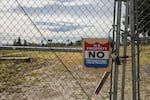
A chain-link fence surrounds the Chemawa Indian School campus.
Rob Manning / OPB
Members of Oregon’s congressional delegation have been visiting, questioning and pressuring leaders at the Bureau of Indian Education for years, seeking answers and accountability for Chemawa Indian School — one of a few boarding schools for Native American students still run directly by the federal government. The latest inquiry in this effort is a close look at the school’s finances by the Interior Department’s Office of Inspector General.
The office confirmed last month in an email to OPB that it had “initiated an audit of the financial management and financial oversight of the Chemawa Indian School.” The audit came in response to U.S. Sens. Ron Wyden and Jeff Merkley, both Democrats, who requested the inquiry after they felt stymied in their own efforts to look into alleged problems at the school.
“These allegations have been difficult to evaluate due to the school’s opaque financial practices. Our offices have repeatedly asked school officials for basic financial data. To date, we have not received a satisfactory response to those requests,” the senators said in the letter sent in October.
Chemawa is the federal government’s oldest, continuously operating boarding school for Native American children in the country. It initially opened in Forest Grove in 1880, before moving a few years later to a hillside at the north end of Salem. A scathing federal report released last month by the U.S. Department of the Interior — the agency that opened and operated those schools in the first place — found practices at those campuses and at similar schools across the country were horrific and traumatic. Many students died at the schools, including at the campuses in Forest Grove and Salem, before the school mission shifted in recent decades toward better treatment and cultural support of Indigenous people. Yet problems remain at schools like Chemawa, as investigations by OPB and government agencies have shown in recent years.
At a congressional hearing on Tuesday, Rep. Suzanne Bonamici, D-Oregon, pressed BIE Director Tony Dearman to outline what his agency and Chemawa are doing to improve the school’s overall performance, from hiring practices to student safety.
“Chemawa has a complex and painful history including recent concerns related to student health and safety, academic shortcomings, treatment of employees, questionable hiring practices and a lack of financial transparency and oversight,” Bonamici said. “I’ve been working since 2015 to obtain accurate timely information from Chemawa leadership,(Bureau of Indian Affairs) and BIE, and I continue to be concerned about the outcomes and safety of Native youth, especially at Chemawa.”
In his response to Bonamici, Dearman confirmed that supervisors of the school were already working with the inspector general, and planning to follow through on whatever the audit recommended.
“Once we receive those recommendations, we’ll definitely look at implementing those to make us stronger and make sure that our oversight is improved,” Dearman told the committee.
Tuesday’s hearing primarily focused on a broader examination of BIE, and its status on the Government Accountability Office’s “high-risk list.” That status means the agency is “especially vulnerable to fraud, waste, abuse, and mismanagement, or in need of transformation.” BIE has been on the list since 2017, though an update released on Tuesday said the agency has met two of the five criteria necessary to come off the list. The report said BIE has shown it has sufficient “leadership commitment” and the recommended “action plan,” but that it still has work to do when it comes to capacity, monitoring and demonstrated progress.
The Interior Department, meanwhile, is continuing to confront the awful legacy of boarding schools, as they devastated the lives of countless Indigenous children and families. Secretary Deb Haaland announced on Tuesday an initial set of hearings with “survivors and descendants” of the schools, starting July 9 in Caddo County, Oklahoma.
